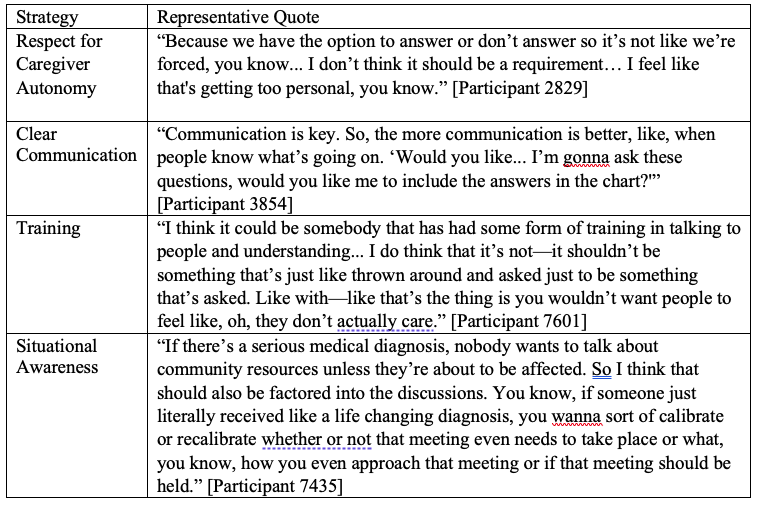Health Equity/Social Determinants of Health
Session: Health Equity/Social Determinants of Health 1
437 - Actionable Strategies to Increase Caregiver Comfort with Health-Related Social Need Interventions
Friday, May 3, 2024
5:15 PM - 7:15 PM ET
Poster Number: 437
Publication Number: 437.437
Publication Number: 437.437

Danielle Cullen, MD, MPH, MSHP (she/her/hers)
Assistant Professor
Children's Hospital of Philadelphia
Philadelphia, Pennsylvania, United States
Presenting Author(s)
Background: Screening for health-related social needs (HRSN) has a growing role in pediatric healthcare, providing a more comprehensive understanding of factors influencing a patient’s health and allowing clinicians to provide holistic care. Despite the importance of HRSN, screening is often associated with caregiver concerns regarding stigma or negative repercussions like child protective service involvement for issues related to poverty. While previous literature has highlighted many of these barriers to caregiver comfort in screening, there has been limited focus on practical solutions to overcome these obstacles.
Objective: The goal of our study was to identify caregiver suggested strategies to increase family-level comfort with HRSN assessments and interventions.
Design/Methods: This qualitative analysis was nested within a pragmatic RCT on social care integration (SECURE study). Caregivers of pediatric patients were enrolled at two primary care clinics and one emergency department affiliated with a large pediatric healthcare system. A hybrid random-purposive sampling strategy was used to ensure representation across key demographics and intervention conditions. An interview guide and codebook were developed based on the Integrated Behavioral Model (IBM). Telephone interviews were conducted in English and Spanish and were recorded and transcribed verbatim. Content analysis with constant comparison was used to code interviews inductively and identify emerging themes.
Results: We coded and analyzed 49 English and 11 Spanish interviews. We identified 4 themes that contributed to caregiver comfort with assessment: 1) clear communication regarding the purpose of screening and plans for data collection and use; 2) respect for caregiver autonomy, for example by providing the option to decline participation in HRSN screening; 3) training of personnel involved in assessments to ensure privacy and compassionate care; and 4) consideration of timing within the medical visit and presence of family stressors, delaying assessment and intervention until resolution of medical need.
Conclusion(s): Actionable, family-informed strategies that enhance caregiver comfort with HRSN interventions include clearly explaining the purpose of screening before requesting participation, allowing caregivers to decline screening, training those administering HRSN interventions to be compassionate and discrete, and conducting screening after resolution of medical need. Caregiver-informed solutions are essential to ensuring that HRSN interventions are equitable and family-centered.

